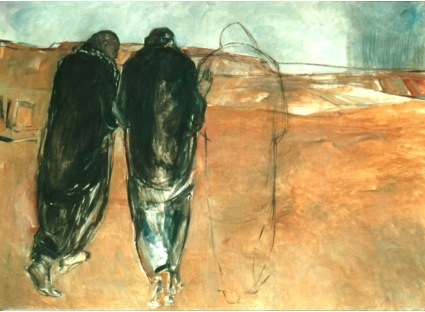I remember as a child asking God to forgive me and accept me into His family, but afterward, every time I sinned, I would worry that maybe God had kicked me out of His family or that He didn’t love me anymore.
 I made it an almost daily habit to ask God back into my heart. I never really knew for sure where I stood with God, and so prayed daily to thank Him for loving me if He still did, but if He did not, then would He please forgive me and start loving me again.
I made it an almost daily habit to ask God back into my heart. I never really knew for sure where I stood with God, and so prayed daily to thank Him for loving me if He still did, but if He did not, then would He please forgive me and start loving me again.
I didn’t really have too many major sins to be worried about. It was just the normal kid stuff, such as talking back to my parents, getting mad at one of my sisters, or stealing a piece of penny candy from the glass bowl on the pastor’s desk at church.
Asking the Devil into My Heart
One time, though, I heard that a true Christian could never be possessed by the devil, so I decided to test whether or not I was a true Christian by praying to the devil and inviting him into my heart.
I remember feeling relieved afterward that I could still name the name of Jesus and pray to God, but for many years after that, I wondered if I had in fact been possessed by the devil and he was just deceiving me into thinking I had not.
So I prayed and begged for God’s forgiveness and that He would keep me in His family.
Getting Addicted to Porn
In Junior High and High School, I fell into a sin which I could never seem to beat. This was a sin which most males struggle with most of their lives, but which few Christians talk about. It was pornography. This cycle of sin led me into a cycle of shame, guilt, and fear, which then led to tearful confessions, repentance, and promises to never do it again, only to fall right back into it a few days or weeks later.
 Similar sorts of sins, problems, and fears followed me into college, adulthood, marriage, and even into my first years as a pastor.
Similar sorts of sins, problems, and fears followed me into college, adulthood, marriage, and even into my first years as a pastor.
Finding Freedom in God’s Love and Grace
It was during college that I first began to see some of the central truths of the gospel, and it was because of these truths that I first began to find the freedom, liberty, and joy in my relationship with God that I had often heard about but had rarely experienced.
These gospel truths liberated me from the fear of God’s rejection and the shame of my sin.
Later, during my years as a pastor, I came to understand the limitless freedom of God’s grace, and how to invite people into a relationship with God centered on grace instead of on our own performance.
In more recent years, these truths have continued to blossom, flourish, and grow into a certainty about the centrality of God’s unconditional love for everything in the life of the Christian. The fact that God’s love is unconditional means that there is nothing we need to do (or stop doing) to earn it, keep it, or prove it.
In my course, The Gospel According to Scripture, I share some of the truths with you that I have learned over the past couple decades which have helped and encouraged me.
 I share with you what I have learned about God’s infinite love, grace, and forgiveness. I want you to begin to experience these truths in your own life, so that you not only come to a fuller understanding of the gospel, but so that you can actually begin to experience the promises and freedoms of the gospel in a real and tangible way.
I share with you what I have learned about God’s infinite love, grace, and forgiveness. I want you to begin to experience these truths in your own life, so that you not only come to a fuller understanding of the gospel, but so that you can actually begin to experience the promises and freedoms of the gospel in a real and tangible way.
If you take the course, you will see that God is pure love, that God’s love for you is unconditional and unadulterated. Once you see this, your fear and shame will fade away, because there is no fear in love (1 John 4:18). You will come to recognize that since God loves you completely and unconditionally, there is nothing you need to do to earn or keep God’s love for you.
 Want to learn more about the gospel? Take my new course, "The Gospel According to Scripture."
Want to learn more about the gospel? Take my new course, "The Gospel According to Scripture."
The entire course is free for those who join my online Discipleship group here on RedeemingGod.com. I can't wait to see you inside the course!






 In Joshua 6, Joshua leads the people of Israel in their first campaign against the Canaanites. This is the battle of Jericho. After the walls of Jericho fell down, Joshua instructs the people to go into the city and kill everything, including the women, children, and animals, and then burn everything (Joshua 6:17-24). The only people who were spared were those who accepted and helped the Israelite people, which in this case, consisted of a prostitute named Rahab and her family.
In Joshua 6, Joshua leads the people of Israel in their first campaign against the Canaanites. This is the battle of Jericho. After the walls of Jericho fell down, Joshua instructs the people to go into the city and kill everything, including the women, children, and animals, and then burn everything (Joshua 6:17-24). The only people who were spared were those who accepted and helped the Israelite people, which in this case, consisted of a prostitute named Rahab and her family.
 In Joshua 10, we have a long listing of all the groups of people that Joshua slaughtered. This list is so long, it carries over into Joshua 11.
In Joshua 10, we have a long listing of all the groups of people that Joshua slaughtered. This list is so long, it carries over into Joshua 11. The first Joshua sought to kill others in the name of God, while the second Joshua allowed Himself to be killed so that He might reveal God.
The first Joshua sought to kill others in the name of God, while the second Joshua allowed Himself to be killed so that He might reveal God.
 But I also knew that knowing Scripture, and knowing theology, and knowing about grace is not really the point of it all. The point of it all is to actually
But I also knew that knowing Scripture, and knowing theology, and knowing about grace is not really the point of it all. The point of it all is to actually 
 And trust me … if you follow Jesus, you will never get bored.
And trust me … if you follow Jesus, you will never get bored.
 Have you ever wondered why God doesn’t make Himself more obvious?
Have you ever wondered why God doesn’t make Himself more obvious? He and I were talking next to our wood pile (we heated our home with fire wood) and there was a two by four sitting right on top … it was about four feet long … perfect for knocking someone over the head. He pointed to it and said, “See that two by four, God? Come on! Hit me over the head with it! Right now! If you exist and if you love you me, knock me out!”
He and I were talking next to our wood pile (we heated our home with fire wood) and there was a two by four sitting right on top … it was about four feet long … perfect for knocking someone over the head. He pointed to it and said, “See that two by four, God? Come on! Hit me over the head with it! Right now! If you exist and if you love you me, knock me out!” God hides Himself because God loves and respects us so much.
God hides Himself because God loves and respects us so much. Because He loves us.
Because He loves us.

